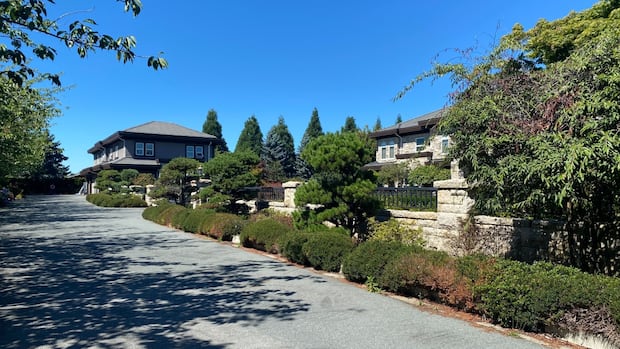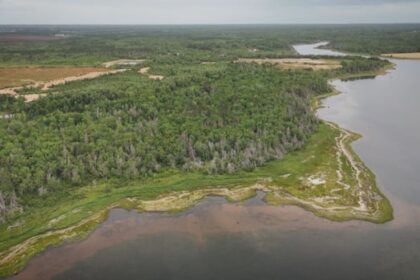British ColumbiaA ruling in B.C. Supreme Court confirmed Cowichan Aboriginal title and fishing rights over the stretch of land on Lulu Island next to the south arm of the Fraser River where the nation historically had a summer village — now an area with large mansions.Cowichan Nation’s lawsuit win reverberating as B.C. attorney general promises to challenge title rulingA property on No. 6 Road in Richmond, B.C., that appears to fall within the boundaries of an Aboriginal title claim, successfully established by the Cowichan Nation, is seen on Tuesday. (Nono Shen/The Canadian Press)The stretch of semi-rural land on No. 6 Road in Richmond, B.C., is home to blueberry farms, multimillion-dollar mansions and an 18-hole golf course.Those Metro Vancouver properties are all now encompassed by a landmark Aboriginal title claim that was successfully established by the Cowichan Nation last week.The ruling in B.C. Supreme Court confirmed Cowichan Aboriginal title and fishing rights over the stretch of land on Lulu Island next to the south arm of the Fraser River, where the nation historically had a summer village and members fished for salmon.Now it is occupied by Crown and City of Richmond holdings — as well as private properties that include a 10,600- square-foot home with 11 bathrooms and an official valuation of $7.78 million, other multimillion-dollar homes and the Country Meadows Golf Course.WATCH | UVic prof says Supreme Court needs to weigh in on case: Supreme Court needs to determine relationship between Aboriginal title and private owners: UVic profBrian Thom, the chair of anthropology at the University of Victoria, said the Cowichan Tribes ruling opens the door for higher courts to make a final determination on the relationship between Aboriginal title and fee simple title. Speaking with BC Today guest host Dan Burritt, Thom cited the judge’s ruling that demands governments reconcile issues in good faith. The ruling by Justice Barbara Young says the Cowichan did not seek a declaration that private titles in the area were “defective and invalid,” unlike those for the land owned by the Crown and city that makes up much of the claim.But the judge ruled the province has a duty to negotiate with the nation when it comes to the private land, whose titles were granted in what she called an unjustifiable infringement of the Cowichan’s Aboriginal title.Lawyer David Robbins, who represented the Cowichan in the trial that lasted more than 500 days, said Tuesday that the nation did not bring its case against private titleholders “and did not seek to invalidate their interests in this case.””It is the Crown in right of British Columbia that has the legal relationship with the holders of private fee simple interests. The Cowichan Nation has no direct relationship with those titleholders,” he said.Industrial used land between No. 5 Road and No. 8 Road along the north side of the Fraser River in Richmond, B.C, on Tuesday. (Ben Nelms/CBC)The Ministry of Attorney General said in a statement that it was “committed to protecting and upholding private property rights while advancing the critical work of reconciliation.”The ministry said the number of private properties encompassed by the claim area was being assessed.Map includes mansionsBut a map of the Cowichan title lands that was part of the court ruling, combined with publicly available land documents, identify the mansions and other properties along Richmond’s No. 6 Road, south of Blundell Road.Harry Hogler co-owns the Country Meadows Golf Course and lives across the road in a 8,900-square-foot home, featuring a fountain and a classic car in the circular driveway.Hogler declined to be interviewed but said he was aware of the ruling and was “not worried.”However, B.C. Attorney General Niki Sharma said on Monday that the case could have “significant unintended consequences” for private property rights in the province, and the government would appeal the ruling.Attorney General Niki Sharma said the province would appeal the decision. (Ben Nelms/CBC)That’s no surprise to Robin Junger, a lawyer with McMillan LLP focused on Indigenous and environmental law.He said if the decision stands it will have “massive implications” and “could undermine the whole system of land ownership in British Columbia.””Although the court was only asked to give a ‘declaration’ in relation to lands held by the City of Richmond and the Government of Canada, the reasoning of the court isn’t limited to those lands,” he said.Junger said he believes the decision would likely be overturned on appeal and go all the way to the Supreme Court of Canada.He said if he were a property owner he would not panic.Junger said a judge only goes by what parties argue in a case, adding he believes there are “reasonable grounds to pursue” an appeal on the key question of whether B.C. extinguished Aboriginal title when it issued private fee simple land titles, and whether it had the authority to do so.”If you look very closely at the decision, you’ll see that the B.C. government, and in fact the Government of Canada, did not argue that these rights were extinguished. They declined to make that argument. Only the City of Richmond made that argument,” he said.”So, I think there’s a lot of fertile ground to follow on an appeal, and we’ll see where it lands.”WATCH | B.C. government to appeal ruling: Province to appeal B.C. Supreme Court ruling in favour of Cowichan Nation’s fishing and land rightsThe province has announced plans to appeal last week’s B.C. Supreme Court decision that found in favour of the Cowichan Nation’s bid to win back fishing rights and title for a portion of its historic lands in Richmond, B.C. Claire Palmer has more.Some other residents of No. 6 Road whose homes are within the Cowichan title lands said they were aware of the ruling, while others were not.One resident arriving at a home valued at more than $4.1 million said Tuesday that he would “fight” the ruling. He declined to be identified or to give a longer interview.Nearby, an elderly woman was selling blueberries outside a large stone home. She said in Mandarin that her son owned the home but she did not think he was aware of the ruling.At one of the most expensive homes in the neighbourhood, according to B.C. Assessment, a woman who was driving out of the property said it was owned by a friend who was in China. She said she was unaware of the court ruling.
Cowichan title lands encompass multimillion-dollar mansions in Richmond, B.C.











